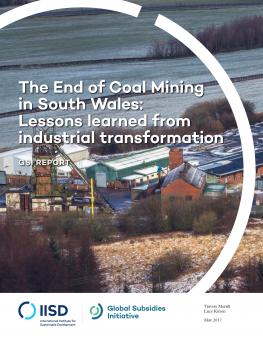
The End of Coal Mining in South Wales: Lessons learned from industrial transformation
The decline of coal mining in South Wales has important lessons for policy-makers and civil society grappling with the challenges of transition—what can be learned from this experience?
This report reviews the decline of coal mining in South Wales in the United Kingdom.
It is part of a broader project examining the economic and social effects that arise when mining communities transition away from coal, and the policies that could be implemented to address these effects. While the context of transition varies, the experience of South Wales offers some useful lessons for policy-makers and civil society elsewhere that face a similar shift away from coal. This report aims to highlight these lessons while describing the conditions in South Wales, in hopes of informing future policy development elsewhere.
The report reviews the economic and political context of coal mining in South Wales, describing the origins of coal mining, its growth through the industrial revolution and into the inter-war period, its gradual but irreversible decline after the Second World War, and its eventual disappearance in the 1990s. It then examines the pronounced social and community consequences of mining and the closure of coalmines, drawing attention to the role of unionized labour and the role it played throughout the rise and fall of mining in Wales.
The government introduced a number of policies in an attempt to mitigate the effects of the transition away from coal mining. In particular, this case study examines the role of agencies established to attract inward investment into the region, notably the Welsh Development Agency (WDA), and the contribution of European Union funds for this purpose. It concludes that on a macroeconomic level, and in the short and medium terms, available evidence suggests that WDA was an extremely successful intervention but at the level of individual mining communities and over the longer term, the success of the WDA was more muted.
More broadly, the overarching lesson from the Welsh experience is the powerful influence of global economic factors and the need to establish a critical mass of local skills and resilience to respond to both the closure of collieries and subsequent economic changes.
You might also be interested in
Increased Support Needed to Achieve India's Clean Energy Goals
India is on track to achieve many of its 2030 clean energy goals but needs to step up government support measures to accelerate the deployment of offshore wind, electric vehicles, and green hydrogen, according to a new report.
Ending Export Credits for Oil and Gas: How OECD countries can end 2024 with a climate win
For a year now, Organisation of Petroleum Exporting Countries (OECD) governments have been negotiating an agreement that could put an end to oil and gas export finance. Following the acrimony in Baku, this would be a very real way for the OECD to show policy coherence, respond to calls from the poorest countries to stop subsidizing fossil fuels, and shift public finance to solutions.
Fossil Fuel Production, Renewable Energy, and Subsidy Reform in Nationally Determined Contributions 3.0
This policy brief provides an analysis of the critical benchmarks and recommendations necessary for aligning nationally determined contributions (NDCs) with the 1.5 °C target.
COP 29 Outcome Moves Needle on Finance
In the last hours of negotiations, concerted pressure from the most vulnerable developing countries resulted in an improved outcome on the finance target, with a decision to set a goal of at least USD 300 billion per year by 2035 for developing countries to advance their climate action.